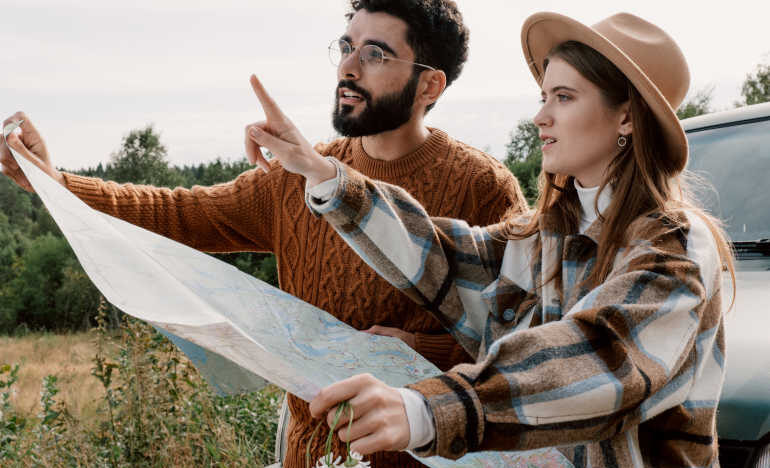Navigating New Territory

An Assembling God’s Puzzle video
By Fr. Garry Richmeier, C.PP.S.
Summer is a time of vacation travel for many people, and some people like to visit places they’ve never been before.
Probably most of us know the feeling of being in an unfamiliar country, culture, or geographical location. It’s often exciting to experience new people and places, but it can be somewhat uncomfortable and even a little scary sometimes if we find ourselves someplace that is very foreign to us.
When travelling to a different country, for example, we may not be familiar with the language, or the money exchange rate, or if the food and water is safe for us. That is why we often choose to go to places that are new to us, but within our comfort zone for dealing with new territory.
When we are forced into new territory by life’s circumstances, it may not be so fun, exciting, or comfortable. Examples of such new territory include changing jobs, moving to a different home, learning a new phone app, or having a conversation with someone we’ve never met. We are constantly moving into new territory in some way, and it’s a piece of the puzzle of life that we need to deal with.
What helps us deal with navigating new territory with less fear and anxiety?
One thing that helps is to expect that things will be different in new territory. That may sound obvious, but we humans sometimes overlook the obvious. For example, there is a stereotype called “the ugly American,” who travels abroad and says things like “Why don’t these people speak English?”, or at a café, “Why don’t they have ketchup on the table?”
Or we have a conversation with someone we just met (new territory) and we expect them to think like us. Or we find ourselves at a new chronological age (new territory) and we can’t understand why we can’t do everything we did when we were younger. Expecting things to be different in new territory can relieve us of some of the shock involved in dealing with what is new.
Another helpful thing is to prepare as much as possible for going into the new territory. With travel, this may include figuring out how to use your phone for translating between languages, or doing a little research on the country or culture you will visit. It may mean becoming more familiar with what is typically involved in the process of aging, or at a new job asking coworkers how things work there. Preparation can help ease us into the new situation.
It is also good to cultivate a healthy curiosity about how things work in the new territory, to ask “Why is this the way it is?” rather than proclaiming “This shouldn’t be this way.” Asking questions for the purpose of understanding is very helpful in this regard. This requires an openness to the possibility that what is different is a new facet or aspect of God’s diverse creation, and is valuable.
Also helpful is an openness to consider the new territory as a means of personal growth. With such a view, new territory can often expand our knowledge, experience, understanding, connectedness with others, and our appreciation of the rich diversity of creation.
Finally, we need to honor our own inexperience and ignorance when it comes to new territory. By definition, new territory is NEW, and it is unrealistic to think we should know all about it. Yet some people feel stupid or embarrassed when they enter new territory, so they avoid it altogether, or they arrogantly pretend to know all about it, like the ugly American stereotype.
Admitting and accepting the fact that we are neophytes in the new territory helps us to be more open to letting the new experiences help us grow.
New territory is unavoidable. In reality, each new day is new territory. Each new conversation is new territory. If we approach each new thing as just another opportunity God gives us to grow and expand our horizons, we might be able to navigate life’s journey with less fear and anxiety, and with more wonder, awe, and gratefulness.
All of the videos in this series can be found here: Assembly God’s Puzzle.
Never miss an article published on the Renewal Center website: Sign up to receive our newsletters.
[Fr. Garry Richmeier, a Precious Blood priest and spiritual director, holds a Master’s of Divinity Degree from St John’s University in Collegeville, Minnesota, and a Master’s of Counseling Psychology degree from the University of Missouri-Kansas City. He is a licensed professional counselor and a licensed marriage and family therapist.]
Photo by cottonbro studio: https://www.pexels.com/photo/a-couple-holding-a-map-5966321/
Related

Making a Banner for Lent Part 2
A Coffee with Padre Video
Fr. Timothy finishes his Lenten banner and continues his reflections on how colors and materials become potent symbols that bring the Lenten season alive. The final banner serves as a visual reminder of our spiritual journeys.

Lent Video Four — Guided Meditation: ‘Traveling in the Dust of the Rabbi’
In this video, Fr. Ron reads the Gospel, Mark 1:29-34, for you and then leads you through a guided meditation, taking you deeper into that story. He calls this experience “an example of traveling in the dust of the rabbi.”
Categories
Assembling God's Puzzle Coffee with Padre Cooking & Spirituality Encounters of the 4th Kind Family Matters Reflections on the Eucharsitic Prayers Spiritual Resources Taize Prayers The Contemplative Life Traveling with Pilgrims of Hope Uncategorized Videos Week of Prayer for Uhristian Unity When you need a little help
